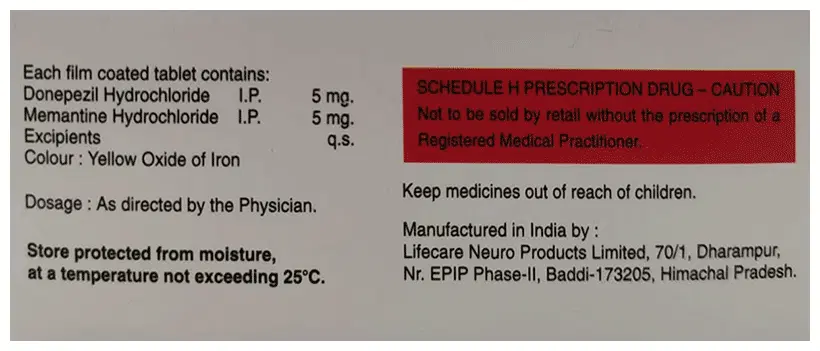Namzaric (Memantine HCL + Donepezil HCL) Tablet
Generic
Memantine HCL + Donepezil HCL (Generic Equivalent to Namzaric)
Memantine HCL + Donepezil HCL (Generic Equivalent to Namzaric)
Memantine HCL + Donepezil HCL (Generic Equivalent to Namzaric)
Memantine HCL + Donepezil HCL (Generic Equivalent to Namzaric)
Donepezil belongs to a class of medications known as cholinesterase inhibitors. It works by increasing the levels of acetylcholine, a neurotransmitter involved in memory and learning, in the brain. Donepezil helps improve cognitive function, including memory, attention, reasoning, and language, by inhibiting the breakdown of acetylcholine. This can lead to symptomatic relief and may slow down the progression of Alzheimer’s disease.
Memantine is an N-methyl-D-aspartate (NMDA) receptor antagonist. It works by blocking the excessive activity of glutamate, an excitatory neurotransmitter, in the brain. Glutamate overactivity is believed to contribute to neuronal damage and cognitive decline in Alzheimer’s disease. By modulating glutamate transmission, memantine helps regulate neuronal function, protect against excitotoxicity, and maintain cognitive stability. Memantine is typically prescribed for moderate to severe Alzheimer’s disease when there is significant neuronal damage and cognitive impairment.
Namzaric combines the therapeutic effects of donepezil and memantine in a single tablet. This combination approach targets multiple aspects of Alzheimer’s pathology, including cholinergic dysfunction and glutamatergic dysregulation, to provide comprehensive treatment and symptom management. By combining two complementary mechanisms of action, Namzaric may offer greater efficacy in improving cognitive function and slowing disease progression compared to monotherapy with either donepezil or memantine alone.
Namzaric is indicated for the treatment of moderate to severe Alzheimer’s disease in patients who are already taking donepezil, the standard treatment for Alzheimer’s disease. It is not recommended for use in patients with mild Alzheimer’s disease or as initial monotherapy. Namzaric is available in several dosage strengths to accommodate individual patient needs and treatment response.
Uses Of Namzaric Tablet
- Combination Therapy
- Symptom Management
- Management of Alzheimer’s Disease
Benefits Of Namzaric Tablet
Comprehensive Treatment
Namzaric combines two active ingredients, donepezil and memantine, in a single tablet. Donepezil is a cholinesterase inhibitor that helps improve cognitive function by increasing levels of acetylcholine in the brain, while memantine is an NMDA receptor antagonist that helps regulate neuronal function and protect against excitotoxicity. By combining these two medications, Namzaric offers comprehensive treatment for Alzheimer’s disease by addressing multiple aspects of its pathology.
Long-Term Maintenance Therapy
Namzaric is intended for long-term use as a maintenance therapy in patients with moderate to severe Alzheimer’s disease. It provides sustained cognitive benefits and may slow disease progression over time, allowing patients to maintain cognitive stability and functional independence for longer periods.
Side Effects Of Namzaric Tablet
It’s important to discuss any side effects or concerns with a healthcare professional. In some cases, dosage adjustments or alternative medications may be necessary to minimize side effects while maintaining effective treatment for Alzheimer’s disease.
Common Side Effects Of Namzaric
- Urinary Tract Infections
- Increased Blood Pressure
- Allergic Reactions
How To Use Namzaric Tablet
Remember to communicate openly with your healthcare provider about your treatment experience, including any side effects or concerns you may have. Your doctor can provide guidance and adjustments to ensure the safe and effective use of Namzaric in managing Alzheimer’s disease.
How Namzaric Tablet Works
Overall, Namzaric works by enhancing cholinergic function and modulating glutamatergic transmission in the brain, leading to improvements in cognitive function and potentially slowing the progression of moderate to severe Alzheimer’s disease. It provides a comprehensive treatment approach for individuals living with Alzheimer’s disease, helping to maintain cognitive stability and quality of life.
Disclaimer :The information provided on the website is intended to facilitate awareness about healthcare products and medical conditions generally but it is not a substitute for professional medical attention or advice. You should always speak with a qualified healthcare practitioner before taking any prescription or non-prescription drug. |
| Product Type--Salt | Generic–Memantine HCL + Donepezil HCL (Generic Equivalent to Namzaric) |
|---|---|
| tag--Manufacturer | Best Selling–Holy Evolution Pharma, Top Brand–Psycormedies, Best Selling–Origin Health Care, Top Brand–Talin Remedies |
| Power--Pack Size | 5mg + 5mg–30 Tablets, 5mg + 5mg–60 Tablets, 5mg + 5mg–90 Tablets, 5mg + 5mg–180 Tablets, 5mg + 5mg–30 Tablets, 5mg + 5mg–60 Tablets, 5mg + 5mg–90 Tablets, 5mg + 5mg–180 Tablets, 10mg + 5mg–30 Tablets, 10mg + 5mg–60 Tablets, 10mg + 5mg–90 Tablets, 10mg + 5mg–180 Tablets, 10mg + 5mg–30 Tablets, 10mg + 5mg–60 Tablets, 10mg + 5mg–90 Tablets, 10mg + 5mg–180 Tablets |



